C++中默认构造函数就是没有形参的构造函数。准确的说法,按照《C++ Primer》中定义:只要定义一个对象时没有提供初始化式,就是用默认构造函数。为所有 的形参提供默认实参的构造函数也定义了默认构造函数。
合成的默认构造函数,即编译器自动生成的默认构造函数。《C++ Primer》中的说明:一个类哪怕只定义了一个构造函数,编译器也不会再生成默认构造函数。这条规则的根据是,如果一个类再某种情况下需要控制对象初始化,则该类很可能在所有情况下都需要控制。只有当一个类没有定义构造函数时,编译器才会自动生成一个默认构造函数。
需要注意的是自定义的构造函数包括拷贝构造函数。就是说在下面这种情况下,编译器也不会自动生成默认构造函数,代码会出错。把拷贝构造函数删除掉后就没有问题了。
编译器为类自动生成的函数包括默认构造函数,拷贝构造函数,析构函数,赋值函数。但是如果自己定义了拷贝构造函数,那么默认构造函数编译器就不会自动生成了。但是自己定义了默认构造函数时其他函数都会自动生成。
注意拷贝构造函数的参数类型为const Base &类型。&是必须的很容易理解,需要传递引用才行。至于const参数在g++中不加在编译时会报错,在vs中能通过编译。不过建议还是加上,因为传递的是引用,根据原对象构造新的对象时当然不希望将原对象改变。
#include <iostream>
using namespace std;
class Base{
public:
//构造函数
//Base(){
// cout<<"default constructor invoke!"<<endl;
//}
//Base(int d){
// this->data=d;
// cout<<"constructor invoke!"<<endl;
//}
//拷贝构造函数
Base(const Base &b){
cout<<"copy constructor invoke!"<<endl;
this->data=b.data;
}
//赋值操作符
Base & operator=(const Base &b){
cout<<"operator constructor invoke!"<<endl;
this->data=b.data;
}
//7构函数
~Base(){
cout<<"deconstructor invoke!"<<endl;
}
private:
int data;
};
int main(){
Base b;
return 0;
}
#include <iostream>
using namespace std;
class Base{
public:
//构造函数
Base(){
cout<<"default constructor invoke!"<<endl;
}
Base(int d){
this->data=d;
cout<<"constructor invoke!"<<endl;
}
//拷贝构造函数
Base(const Base &b){
cout<<"copy constructor invoke!"<<endl;
this->data=b.data;
}
//赋值操作符
void operator=(const Base &b){
cout<<"operator constructor invoke!"<<endl;
this->data=b.data;
}
//析构函数
~Base(){
cout<<"deconstructor invoke!"<<endl;
}
private:
int data;
};
int main(){
Base b(1);//构造函数调用
Base b2=b;//拷贝构造函数调用
Base b3;//默认构造函数调用
b3=b;//赋值操作符调用
return 0;
}
在g++和vs中执行的结果都是一样的。
然后添加一个函数调用来测试:
#include <iostream>
using namespace std;
class Base{
public:
//构造函数
Base(){
cout<<"default constructor invoke!"<<endl;
}
Base(int d){
this->data=d;
cout<<"constructor invoke!"<<endl;
}
//拷贝构造函数
Base(const Base &b){
cout<<"copy constructor invoke!"<<endl;
this->data=b.data;
}
//赋值操作符
void operator=(const Base &b){
cout<<"operator constructor invoke!"<<endl;
this->data=b.data;
}
//7构函数
~Base(){
cout<<"deconstructor invoke!"<<endl;
}
Base play(Base b){
return b;
}
private:
int data;
};
int main(){
Base b(1);//构造函数调用
Base b2=b;//拷贝构造函数调用
Base b3;//默认构造函数调用
b3=b;//赋值操作符调用
b.play(2);//构造函数调用,拷贝构造函数调用(由于函数返回引起的)
return 0;
}
然后使用直接调用时:
#include <iostream>
using namespace std;
class Base{
public:
//构造函数
Base(){
cout<<"default constructor invoke!"<<endl;
}
Base(int d){
this->data=d;
cout<<"constructor invoke!"<<endl;
}
//拷贝构造函数
Base(const Base &b){
cout<<"copy constructor invoke!"<<endl;
this->data=b.data;
}
//赋值操作符
void operator=(const Base &b){
cout<<"operator constructor invoke!"<<endl;
this->data=b.data;
}
//7构函数
~Base(){
cout<<"deconstructor invoke!"<<endl;
}
Base play(Base b){
return b;
}
private:
int data;
};
int main(){
Base b(1);//构造函数调用
Base b2=b;//拷贝构造函数调用
Base b3;//默认构造函数调用
b3=b;//赋值操作符调用
b.play(2);//构造函数调用,拷贝构造函数调用(由于函数返回引起的)
b.play(b);//<span style="font-size: 11.8181819915771px; font-family: Arial, Helvetica, sans-serif;">第一次拷贝构造函数调用是构造形参,第二次拷贝构造函数调用是函数返回值</span>
return 0;
}
最开始也不明白为什么是两次拷贝构造函数调用。那么打印出每个对象的地址吧。
vs中的结果:
g++中的结果,可以发现g++中的结果参数进栈的顺序还是有规律的,但是vs好像就没有规律了。
这样还是看不明白,但是和下面代码的这种情况进行比较就比较容易理解了:
#include <iostream>
using namespace std;
class Base{
public:
//构造函数
Base(){
cout<<"default constructor invoke!"<<(int *)this<<endl;
}
Base(int d){
this->data=d;
cout<<"constructor invoke!"<<(int *)this<<endl;
}
//拷贝构造函数
Base(const Base &b){
cout<<"copy constructor invoke!"<<(int *)this<<endl;
this->data=b.data;
}
//赋值操作符
void operator=(const Base &b){
cout<<"operator constructor invoke!"<<(int *)this<<endl;
this->data=b.data;
}
//7构函数
~Base(){
cout<<"deconstructor invoke!"<<(int *)this<<endl;
}
Base play(Base b){
return b;
}
private:
int data;
};
int main(){
Base b(1);//构造函数调用
Base b2=b;//拷贝构造函数调用
Base b3;//默认构造函数调用
b3=b;//赋值操作符调用
b.play(2);//构造函数调用,拷贝构造函数调用(由于函数返回引起的)
b.play(b);//第一次拷贝构造函数调用是构造形参,第二次拷贝构造函数调用是函数返回值
cout<<"---------------"<<endl;
Base b4=b.play(2);
cout<<"---------------"<<endl;
Base b5=b.play(b);
cout<<"---------------"<<endl;
return 0;
}
可以发现Base b4=b.play(2);和b.play(2);这行代码相比,析构函数的位置发生了变化,之前是连续两次析构,现在换成了先析构一次,然后函数结束后又析构一次。并且是第二次拷贝构造函数创建的对象在函数结束后析构的(根据对象的地址可以得知)。那么情况可能是这样的,即第二次拷贝构造函数是由于函数返回对象时引起的。因为在函数play调用结束后形参b会被析构掉,所以需要将b复制到一个新的内存区域。调用b.play(2)时的内存布局可能是这样的(根据上面的地址绘制):
为了验证这个测试,可以让play函数不返回B的对象,代码如下:
#include <iostream>
using namespace std;
class Base{
public:
//构造函数
Base(){
cout<<"default constructor invoke!"<<(int *)this<<endl;
}
Base(int d){
this->data=d;
cout<<"constructor invoke!"<<(int *)this<<endl;
}
//拷贝构造函数
Base(const Base &b){
cout<<"copy constructor invoke!"<<(int *)this<<endl;
this->data=b.data;
}
//赋值操作符
void operator=(const Base &b){
cout<<"operator constructor invoke!"<<(int *)this<<endl;
this->data=b.data;
}
//7构函数
~Base(){
cout<<"deconstructor invoke!"<<(int *)this<<endl;
}
void play(Base b){
}
private:
int data;
};
int main(){
Base b(1);//构造函数调用
Base b2=b;//拷贝构造函数调用
Base b3;//默认构造函数调用
b3=b;//赋值操作符调用
b.play(2);//构造函数调用
b.play(b);//调用一次拷贝构造函数
return 0;
}
最后再来看看函数参数为引用的时候的情况,这种情况下不会再创建形参,函数是直接对实参进行操作:
#include <iostream>
using namespace std;
class Base{
public:
//构造函数
Base(){
cout<<"default constructor invoke!"<<(int *)this<<endl;
}
Base(int d){
this->data=d;
cout<<"constructor invoke!"<<(int *)this<<endl;
}
//拷贝构造函数
Base(const Base &b){
cout<<"copy constructor invoke!"<<(int *)this<<endl;
this->data=b.data;
}
//赋值操作符
void operator=(const Base &b){
cout<<"operator constructor invoke!"<<(int *)this<<endl;
this->data=b.data;
}
//7构函数
~Base(){
cout<<"deconstructor invoke!"<<(int *)this<<endl;
}
void play(Base b){
}
void refer(Base b){
cout<<"refer address:"<<(int *)&b<<endl;
}
private:
int data;
};
int main(){
Base b(1);//构造函数调用
Base b2=b;//拷贝构造函数调用
Base b3;//默认构造函数调用
b3=b;//赋值操作符调用
b.play(b);//只会调用拷贝构造函数
b.play(2);//构造函数调用
cout<<"-----------------"<<endl;
b.refer(b);
cout<<"-----------------"<<endl;
return 0;
}
refer函数参数为引用返回对象时:
#include <iostream>
using namespace std;
class Base{
public:
//构造函数
Base(){
cout<<"default constructor invoke!"<<(int *)this<<endl;
}
Base(int d){
this->data=d;
cout<<"constructor invoke!"<<(int *)this<<endl;
}
//拷贝构造函数
Base(const Base &b){
cout<<"copy constructor invoke!"<<(int *)this<<endl;
this->data=b.data;
}
//赋值操作符
void operator=(const Base &b){
cout<<"operator constructor invoke!"<<(int *)this<<endl;
this->data=b.data;
}
//7构函数
~Base(){
cout<<"deconstructor invoke!"<<(int *)this<<endl;
}
void play(Base b){
}
Base refer(Base & b){
cout<<"refer address:"<<(int *)&b<<endl;
return b;
}
private:
int data;
};
int main(){
Base b(1);//构造函数调用
Base b2=b;//拷贝构造函数调用
Base b3;//默认构造函数调用
b3=b;//赋值操作符调用
b.play(b);//只会调用拷贝构造函数
b.play(2);//构造函数调用
cout<<"-----------------"<<endl;
b.refer(b);
cout<<"-----------------"<<endl;
return 0;
}
refer函数参数为引用并且返回引用时,才不会调用拷贝构造函数:
#include <iostream>
using namespace std;
class Base{
public:
//构造函数
Base(){
cout<<"default constructor invoke!"<<(int *)this<<endl;
}
Base(int d){
this->data=d;
cout<<"constructor invoke!"<<(int *)this<<endl;
}
//拷贝构造函数
Base(const Base &b){
cout<<"copy constructor invoke!"<<(int *)this<<endl;
this->data=b.data;
}
//赋值操作符
void operator=(const Base &b){
cout<<"operator constructor invoke!"<<(int *)this<<endl;
this->data=b.data;
}
//7构函数
~Base(){
cout<<"deconstructor invoke!"<<(int *)this<<endl;
}
void play(Base b){
}
Base& refer(Base & b){
cout<<"refer address:"<<(int *)&b<<endl;
return b;
}
private:
int data;
};
int main(){
Base b(1);//构造函数调用
Base b2=b;//拷贝构造函数调用
Base b3;//默认构造函数调用
b3=b;//赋值操作符调用
b.play(b);//只会调用拷贝构造函数
b.play(2);//构造函数调用
cout<<"-----------------"<<endl;
b.refer(b);
cout<<"-----------------"<<endl;
return 0;
}
注意:不能返回局部对象的引用,所以如果参数不为引用是不能返回一个引用的对象的。
到这里应该对构造函数,拷贝构造函数和赋值操作符在何时会调用应该有一个清晰的认识了。








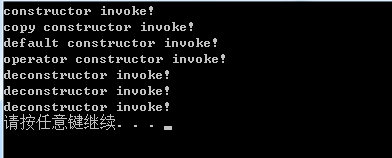
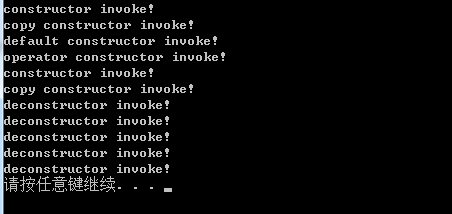
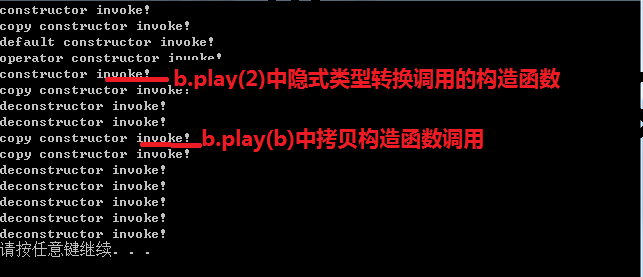
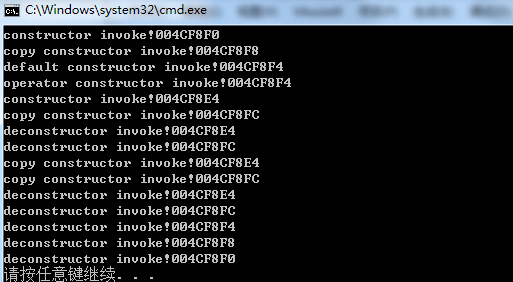
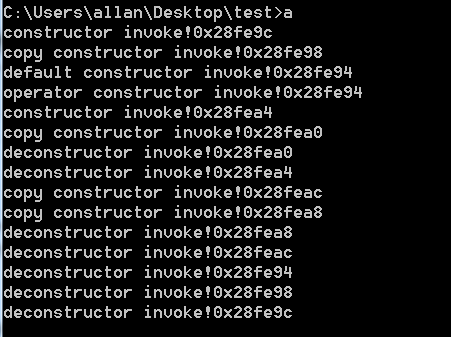
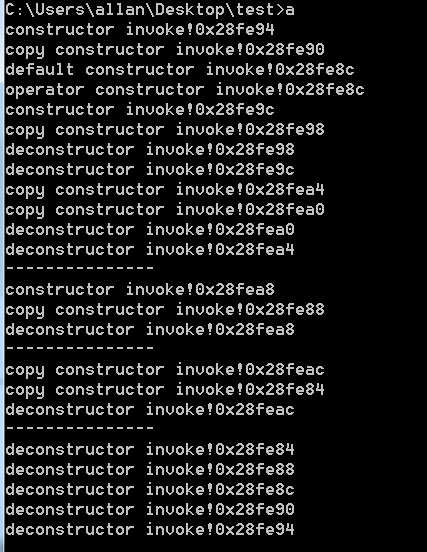
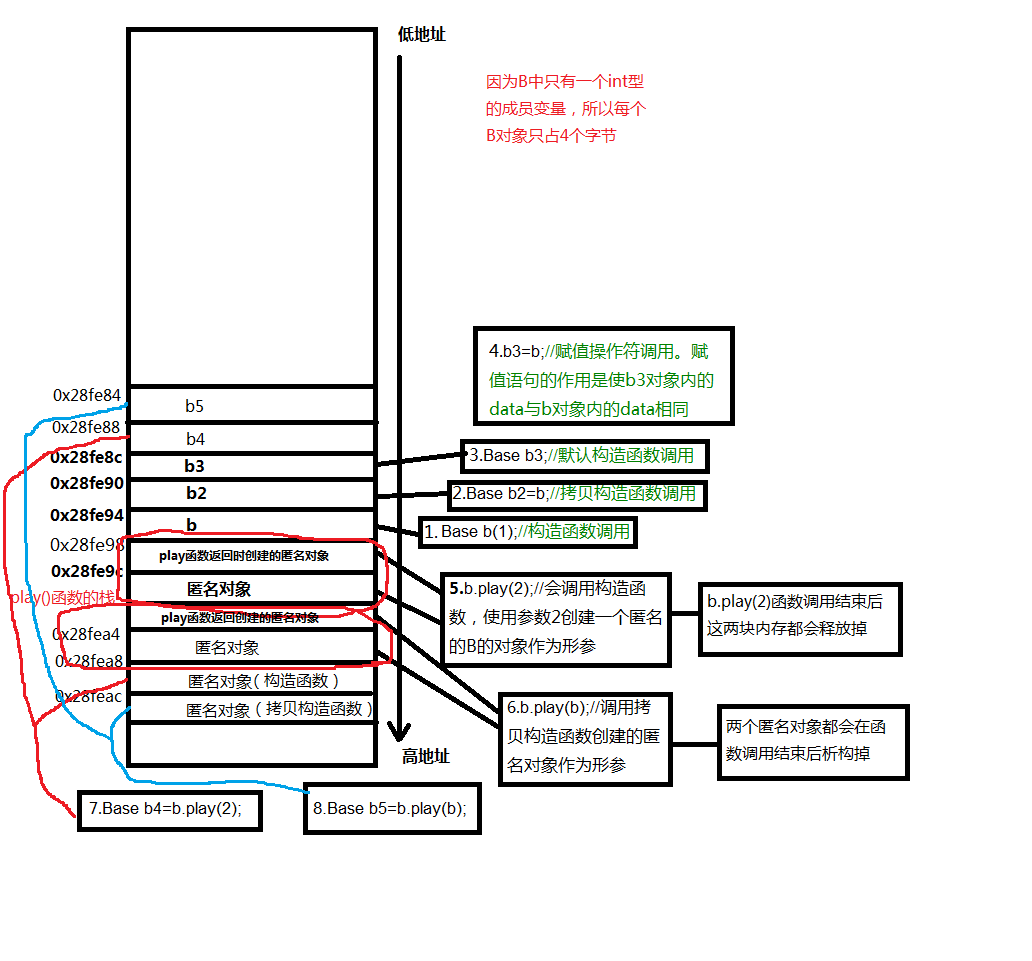
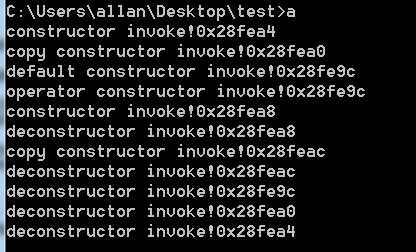
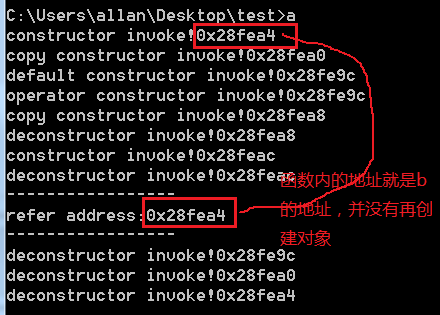
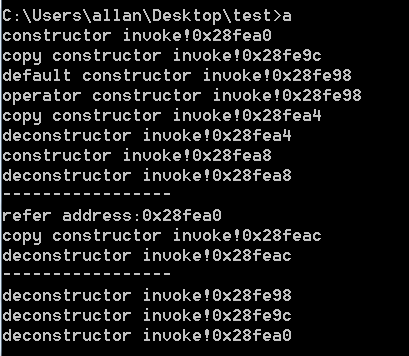
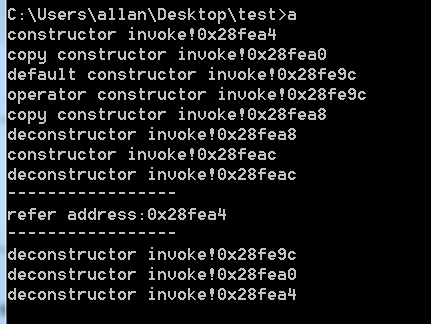













 1万+
1万+











 被折叠的 条评论
为什么被折叠?
被折叠的 条评论
为什么被折叠?








